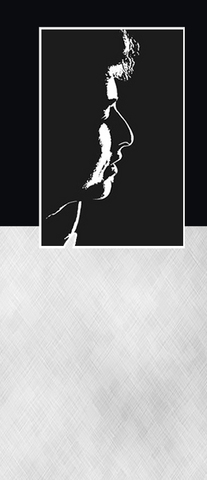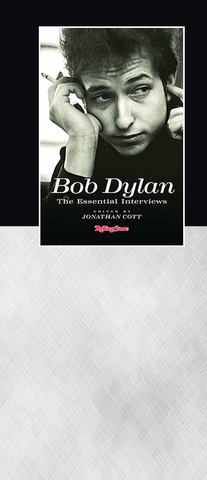Bob Dylan turned 65 on Wednesday to the strains of Forever Young, a song likely to be played by radio stations as if it were the national anthem. What did this symbolize? What were its ramifications? Will reaching that milestone have resonance for an entire generation?
This much is certain: He will hate hearing any of this stuff. "It's horrible," he told Playboy 40 years ago, on one of the countless occasions when he was asked if being a folk hero was a position of great responsibility. "I'll bet Tony Bennett doesn't have to go through this kind of thing. I wonder what Billy the Kid would have answered to such a question."
Billy the Kid didn't engage in a book's worth of verbal showdowns with the press. But Dylan has, and now those interviews have been invaluably collected. In an irresist-ible new anthology edited by Jonathan Cott, one of the original editors of Rolling Stone and arguably the most simpatico writer ever to converse with Dylan, the interview format remains eminently readable through more than 400 pages. And it yields far more than an extended conversation.

The mosaic of discussions found here (very first question: "Bob Dylan, you must be 20 years old now") is many things: biography, oral history, cultural time capsule, music lesson and psychodrama. It expands upon the mesmerizing portrait of Dylan that both his memoir, Chronicles, Volume 1, and Martin Scorsese's documentary No Direction Home have lately provided.
Arranged chronologically, these interviews vary wildly. That accounts for much of their cumulative appeal. A lot depends upon who was asking the questions and how combative or cooperative Dylan happened to be feeling. "What do you think of people who analyze your songs?" he was asked at his only televised full-length news conference, in 1965. "I welcome them -- with open arms," he replied, in much the same unwelcoming spirit on display in Don't Look Back, the 1967 documentary he subsequently renounced.
Sarcasm is an understandable response, given what he found himself up against. Here's another sampling of the same session: Does he prefer songs with messages, like Eve of Destruction? A. "Do I prefer that to what?" Q. "I don't know, but your songs are supposed to have a subtle message." A. "Subtle message???" Q. "Well, they're supposed to." A. "Where'd you hear that?" Q. "In a movie magazine." A. "Oh -- Oh God!"

Clearly, Dylan interviews are not entirely about their subject.
Questioners reveal much about themselves just by talking to him. Jann Wenner, Rolling Stone's editor, managed to inform readers that he slept stark naked and found more importance in his Dylan run-in than might have been warranted. ("It somehow seemed appropriate enough that Judy Garland's funeral coincided with the interview.")
Nat Hentoff, writing for Playboy, gives Dylan's speaking voice a suave vocabulary and syntax it doesn't have elsewhere and remarks that the singer's "tonsorial tastes are on the conservative side," compared with those of other male performers of the 1960s. "How do you feel about these far-out hair styles?" Hentoff wants to know.
Cott, whose own worshipful side emerged via Dylan ("his songs are miracles, his ways mysterious and unfathomable"), could easily have compiled a book's worth of comic absurdities. But he has sought and captured a broad spectrum of Dylan's thinking, and of others' efforts to engage him. The book finds the rising star visiting Kenyon College in 1964, in a precociously good school newspaper account written by the future film critic and screenwriter Jay Cocks. It views Dylan through the beady eyes of A. J. Weberman, who stalked Dylan, stole his garbage and treated him to the occasional political screed. "I went on & gave D a rap against Imperialism, Racism & Sexism (he didn't seem like he was listening)," Weberman declares.
Among those who best subvert Dylan to their own purposes is Sam Shepard, who turns an interview into a two-man, one-act play. It is terse, playful and then abruptly confessional, with a fade-out at the finale. ("Bob stays still, staring off right.")
Here and elsewhere Cott identifies the major sea changes in Dylan's life via conversational format, without undue commentary. The book flags in overusing the interviewers' introductions, which rehash the same biographical details and voice-of-a-generation hyperbole.
In a book that extends from 1962 to 2004 (and shows that in September 2001 the voice of his generation was as speechless as any other), Dylan's assessments of his life and work are steadily illuminating. "There's just something about my lyrics that just have a gallantry to them," he remarked in 1991. "And that might be all they have going for them. However, it's no small thing." Passages like that reaffirm an overriding certitude: Nobody can explain Dylan as well as he, when he cares to do it, can explain himself.
Which is not to say that many, many others do not try. Michael Gray, who has spent years trying to capture Dylan's lightning in a bottle, has produced Bob Dylan Encyclopedia (coming out in the middle of next month), a heavy, utterly idio-syncratic compendium. It's even up-to-date enough to make reference to The Essential Interviews and include a snarky reference to Cott. Among its many other categories: "book endorsements, unfortunate," "blues, inequality of reward in," "co-option of real music by advertising, the," "radical political activity in 1960s-70s US, the strange disappearance of" and "repertoire, Dylan's early, unsuited to commercial radio."
The many entries on individual songs and performers are arbitrary in their length. Sometimes they are Webermanesque in their fury. Under the heading "interviews and the myth of their rarity," Gray assails the claim by Cott and many others that Dylan is any sort of sphinx. According to Gray, Dylan has been averaging an interview a month for four and a half decades.
Neither book performs what would have been a vital function: providing annotations that refer back to Dylan's versions of events in Chronicles. (Ray Gooch and Chloe Kiehl, the New York couple who supposedly made the young Dylan their houseguest amid a cornucopia of wonders, remain elusive in the extreme.) The facts of Dylan's life exist in many variations, and Chronicles tried to correct the record. If he had to be pigeonholed as the voice of a generation, surely he is entitled to the last word.

Dissident artist Ai Weiwei’s (艾未未) famous return to the People’s Republic of China (PRC) has been overshadowed by the astonishing news of the latest arrests of senior military figures for “corruption,” but it is an interesting piece of news in its own right, though more for what Ai does not understand than for what he does. Ai simply lacks the reflective understanding that the loneliness and isolation he imagines are “European” are simply the joys of life as an expat. That goes both ways: “I love Taiwan!” say many still wet-behind-the-ears expats here, not realizing what they love is being an

Google unveiled an artificial intelligence tool Wednesday that its scientists said would help unravel the mysteries of the human genome — and could one day lead to new treatments for diseases. The deep learning model AlphaGenome was hailed by outside researchers as a “breakthrough” that would let scientists study and even simulate the roots of difficult-to-treat genetic diseases. While the first complete map of the human genome in 2003 “gave us the book of life, reading it remained a challenge,” Pushmeet Kohli, vice president of research at Google DeepMind, told journalists. “We have the text,” he said, which is a sequence of

Every now and then, even hardcore hikers like to sleep in, leave the heavy gear at home and just enjoy a relaxed half-day stroll in the mountains: no cold, no steep uphills, no pressure to walk a certain distance in a day. In the winter, the mild climate and lower elevations of the forests in Taiwan’s far south offer a number of easy escapes like this. A prime example is the river above Mudan Reservoir (牡丹水庫): with shallow water, gentle current, abundant wildlife and a complete lack of tourists, this walk is accessible to nearly everyone but still feels quite remote.

It’s a bold filmmaking choice to have a countdown clock on the screen for most of your movie. In the best-case scenario for a movie like Mercy, in which a Los Angeles detective has to prove his innocence to an artificial intelligence judge within said time limit, it heightens the tension. Who hasn’t gotten sweaty palms in, say, a Mission: Impossible movie when the bomb is ticking down and Tom Cruise still hasn’t cleared the building? Why not just extend it for the duration? Perhaps in a better movie it might have worked. Sadly in Mercy, it’s an ever-present reminder of just